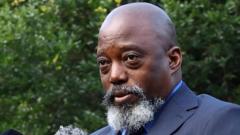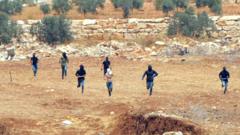The Democratic Republic of Congo's Senate has taken a significant step by stripping former President Joseph Kabila of his immunity, allowing for prosecution over alleged ties to rebel forces.
Kabila's Immunity Lifted: A Historic Move for Justice in DR Congo

Kabila's Immunity Lifted: A Historic Move for Justice in DR Congo
Former President Joseph Kabila faces treason charges as immunity is lifted by Senate.
In a landmark decision, nearly 90 senators voted to lift Joseph Kabila’s legal immunity, opening the door for potential treason and war crimes charges related to his purported support of the M23 armed group in eastern DR Congo. Senate Speaker Jean-Michel Sama Lukonde announced the decision following a session where Kabila did not appear to defend himself. The former leader, who served from 2001 until 2019, has faced accusations of treason based on what authorities describe as extensive evidence linking him to the M23 rebels, who have recently captured several towns in the mineral-rich eastern region.
Kabila, aged 53, has declined to comment on the allegations but has previously denied any affiliation with the insurgents. Following his presidency, he was granted the status of "senator for life," which afforded him legal protection until the military prosecutor's request led to this recent development. For the past two years, Kabila has resided in South Africa, although he indicated intentions to return to address the ongoing conflict.
Justice Minister Mutamba has urged Kabila to return and “face justice,” and has even ordered the seizure of his assets in the meantime. Analysts warn that prosecuting Kabila could exacerbate the country's instability, as protests from his political party, the People's Party for Reconstruction and Democracy (PPRD), claim that the proceedings are merely a distraction from more pressing national issues.
Since stepping down, despite being supportive of current President Tshisekedi's government, relations have soured, culminating in a formal split in late 2020. Meanwhile, fighting between the M23 and Congolese forces continues, as discussions between DR Congo and Rwanda gain momentum towards a potential peace agreement to mitigate the turmoil that has led to widespread civilian displacement.
The political landscape within DR Congo remains fragile, with continued calls for accountability as the country navigates these complex conflicts.
Kabila, aged 53, has declined to comment on the allegations but has previously denied any affiliation with the insurgents. Following his presidency, he was granted the status of "senator for life," which afforded him legal protection until the military prosecutor's request led to this recent development. For the past two years, Kabila has resided in South Africa, although he indicated intentions to return to address the ongoing conflict.
Justice Minister Mutamba has urged Kabila to return and “face justice,” and has even ordered the seizure of his assets in the meantime. Analysts warn that prosecuting Kabila could exacerbate the country's instability, as protests from his political party, the People's Party for Reconstruction and Democracy (PPRD), claim that the proceedings are merely a distraction from more pressing national issues.
Since stepping down, despite being supportive of current President Tshisekedi's government, relations have soured, culminating in a formal split in late 2020. Meanwhile, fighting between the M23 and Congolese forces continues, as discussions between DR Congo and Rwanda gain momentum towards a potential peace agreement to mitigate the turmoil that has led to widespread civilian displacement.
The political landscape within DR Congo remains fragile, with continued calls for accountability as the country navigates these complex conflicts.





















